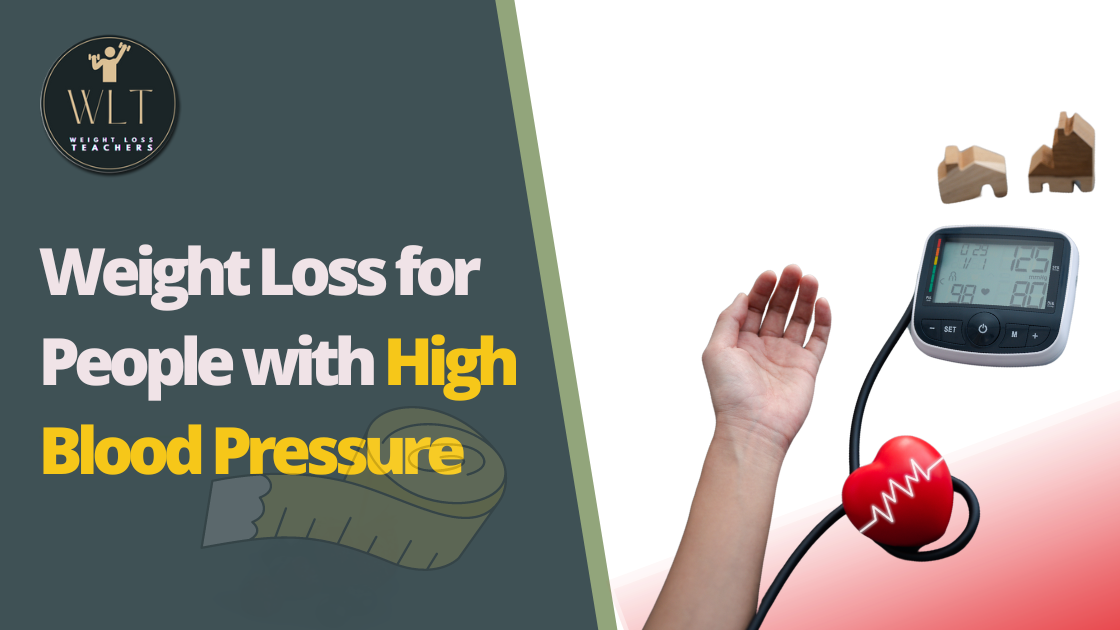
Weight Loss for People with High Blood Pressure
High blood pressure, also known as hypertension, is a common health condition that affects millions of people worldwide. It is a serious condition that can lead to various health problems such as heart disease, stroke, and kidney failure.
Are you trying to lose weight but also managing high blood pressure? It can be a challenging balance, but with the right strategies, it’s entirely achievable. Focusing on a heart-healthy diet, regular exercise, and other lifestyle changes can help you shed pounds safely while keeping your blood pressure in check. Discover the best weight loss tips tailored for those with hypertension. Learn how to integrate these practices into your daily routine for effective and sustainable results. Let’s explore how you can manage both your weight and blood pressure effectively.
Table of Contents
Understanding High Blood Pressure

Before we dive into the topic of weight loss, it is essential to understand high blood pressure and its effects on the body. Blood pressure is the force of blood pushing against the walls of the arteries as the heart pumps blood. When this pressure is consistently high, it can damage the arteries, causing them to become narrow and harden. This can lead to various health problems, such as heart disease, stroke, and kidney failure.
Here’s a table outlining key aspects of understanding high blood pressure (hypertension):
| Aspect | Details |
|---|---|
| Definition | High blood pressure (hypertension) is a condition where the force of the blood against artery walls is too high. |
| Causes | Genetics, diet high in salt, lack of physical activity, obesity, stress, alcohol consumption, smoking, and age. |
| Symptoms | Often none; sometimes headaches, shortness of breath, nosebleeds (usually not until high blood pressure has become severe). |
| Diagnosis | Measured using a sphygmomanometer; readings include systolic and diastolic pressure (e.g., 120/80 mm Hg). |
| Risk Factors | Age, race, family history, being overweight or obese, lack of physical activity, tobacco use, high sodium diet, low potassium diet, excessive alcohol use, stress, chronic conditions (e.g., kidney disease, diabetes). |
| Complications | Heart disease, stroke, kidney damage, vision loss, sexual dysfunction, heart attack, heart failure. |
| Prevention | Eat a healthy diet, reduce salt intake, maintain a healthy weight, exercise regularly, limit alcohol, avoid smoking, manage stress, get regular health check-ups. |
| Treatment | Lifestyle changes (diet, exercise, weight loss), medications (diuretics, ACE inhibitors, beta-blockers, calcium channel blockers). |
| Healthy Blood Pressure Range | Normal blood pressure: Less than 120/80 mm Hg; Elevated: 120-129/less than 80 mm Hg; Hypertension Stage 1: 130-139/80-89 mm Hg; Hypertension Stage 2: 140 and above/90 and above mm Hg. |
This table provides a comprehensive overview of high blood pressure, its causes, symptoms, risk factors, complications, prevention, and treatment options.
High blood pressure is a common condition, and many factors can contribute to it, such as genetics, lifestyle, and underlying health conditions. The most common causes of high blood pressure are unhealthy eating habits, lack of exercise, smoking, and excessive alcohol consumption.
Understanding Hypertension and Weight Connection

Hypertension, a prevalent medical condition worldwide, arises from the interplay of genetic and lifestyle factors. Among these, the impact of excessive weight and obesity on the development and exacerbation of high blood pressure cannot be overstated. The body’s burden of surplus weight necessitates an increased blood supply to adequately nourish the additional tissue, culminating in elevated pressure exerted against the walls of arteries. This heightened pressure strains the cardiovascular system, setting the stage for hypertension’s onset or progression.
Here’s a table outlining the connection between hypertension (high blood pressure) and weight:
| Aspect | Details |
|---|---|
| Definition | Hypertension is a condition where blood flows through the arteries at higher than normal pressures. |
| Causes | Excess weight increases the heart’s workload, leading to higher blood pressure. |
| BMI and Hypertension | Higher BMI (Body Mass Index) is linked to increased blood pressure. |
| Mechanism | Excess body fat can cause complex changes in the body, including increased cholesterol and insulin resistance, which contribute to hypertension. |
| Statistics | Obesity accounts for 65-78% of primary hypertension cases. |
| Health Risks | Hypertension can lead to heart disease, stroke, kidney disease, and other health issues. |
| Prevention | Weight loss, healthy diet, regular exercise, and lifestyle changes can help reduce the risk of hypertension. |
This table provides a clear overview of how weight and hypertension are connected, highlighting key aspects and potential health risks.
Moreover, adipose tissue, colloquially known as fat, is not merely a passive storage unit. Rather, it is a dynamic, metabolically active entity that wields influence over the body’s intricate regulatory mechanisms. This includes the orchestration of hormones and chemicals that can potentially disrupt the body’s natural equilibrium, particularly those governing blood pressure. The adipose tissue’s intricate interplay with hormonal signaling and its potential to perturb established physiological norms underscores its role as a significant player in the complex web connecting excess weight, hormonal dynamics, and the intricate balance of blood pressure regulation.
The Benefits of Weight Loss on Blood Pressure: A Multifaceted Approach to Cardiovascular Wellness

In the ongoing battle against the silent menace of high blood pressure, emerging evidence underscores the pivotal role that weight loss plays in curbing its adverse effects. The intricate relationship between weight and blood pressure has inspired numerous scientific inquiries, consistently highlighting the remarkable benefits that even a moderate reduction in body weight can bestow upon cardiovascular health. This article delves into the profound impact of weight loss on blood pressure levels, unraveling the physiological mechanisms underlying its positive effects.
Losing weight has a significant impact on blood pressure, offering a multifaceted approach to improving cardiovascular health. Here are some key benefits:
- Reduction in Blood Pressure: Weight loss can lead to a direct decrease in blood pressure. Even a modest weight loss of 5-10% of your body weight can result in noticeable reductions in both systolic and diastolic blood pressure1.
- Decreased Strain on the Heart: Excess weight puts extra strain on the heart, forcing it to work harder to pump blood throughout the body. Losing weight reduces this strain, leading to better heart function and lower blood pressure2.
- Improved Arterial Health: High blood pressure can damage arteries, making them less elastic and more prone to blockage. Weight loss helps improve arterial health, reducing the risk of heart disease and stroke1.
- Enhanced Kidney Function: Excess body fat can affect how the kidneys handle sodium, leading to higher blood pressure. Weight loss can improve kidney function, helping to regulate blood pressure more effectively1.
- Better Insulin Sensitivity: Weight loss can improve insulin sensitivity, reducing the risk of type 2 diabetes, which is often associated with hypertension.
- Increased Energy Levels: Shedding extra pounds can lead to increased energy levels, making it easier to engage in physical activity, which further helps in maintaining a healthy weight and blood pressure.
- Psychological Benefits: Achieving weight loss goals can boost self-esteem and reduce stress, both of which can positively impact blood pressure levels3.
- Long-Term Health Benefits: Maintaining a healthy weight through regular exercise and a balanced diet can lead to long-term improvements in cardiovascular health, reducing the risk of chronic diseases3.
By focusing on weight loss as part of a comprehensive approach to cardiovascular wellness, individuals can achieve significant improvements in their blood pressure and overall health
A Vital Connection: Weight Loss and Blood Pressure
High blood pressure, or hypertension, is a global health concern that strikes at the core of cardiovascular well-being. It’s a condition characterized by persistent elevation of blood pressure against arterial walls, exerting strain on the heart and blood vessels. This condition is often a culmination of genetic predisposition and lifestyle choices, and it is the leading risk factor for heart disease, stroke, and kidney dysfunction.
Central to the understanding of hypertension’s intricate tapestry is its association with excess weight and obesity. Scientific inquiry has consistently illuminated the compelling correlation between weight and blood pressure. As individuals embark on a journey to shed those excess pounds, a cascade of physiological transformations unfolds, translating into tangible benefits for blood pressure management.
Note: There might be affiliate links mentioned here. We may receive a commission if you purchase a product through an affiliate link. There is no additional charge for you. Please do your own research before making any online purchases.
Unveiling the Benefits: A Closer Look

Decreased Cardiac Workload
Picture the heart as a tirelessly pumping engine, propelling life-sustaining blood throughout the body’s intricate network of blood vessels. However, when excess weight lingers, this vital organ’s workload surges. The heart is compelled to pump harder, straining against the augmented demands imposed by additional adipose tissue. Weight loss emerges as a beacon of relief, allowing the heart to operate with greater efficiency. As pounds are shed, the heart’s workload decreases, leading to a palpable reduction in pressure exerted against the arterial walls. This respite from overexertion translates into a more harmonious cardiovascular system, where the heart can function optimally without the burdensome shackles of excessive weight.
Improved Endothelial Function
Akin to the gossamer lining within a precious vessel, the endothelium forms the innermost layer of blood vessels. It is a sentinel of cardiovascular health, orchestrating the delicate balance between dilation and constriction of blood vessels. Excess weight can cast a shadow on this delicate ballet, impairing endothelial function and fostering an environment conducive to hypertension’s emergence. Weight loss, akin to a restorative balm, rejuvenates the endothelium’s capacity to facilitate healthy blood flow. As pounds are shed, the endothelium regains its finesse, promoting efficient vasodilation and constriction. Consequently, blood pressure finds equilibrium, and the cardiovascular symphony plays on with renewed harmony.
Enhanced Insulin Sensitivity
Obesity often shares the stage with insulin resistance, an intricate interplay that can aggravate blood pressure dynamics. Insulin resistance impedes the body’s ability to utilize glucose effectively, ushering in a cascade of metabolic disarray. Weight loss acts as a catalyst for change, igniting a transformation that enhances insulin sensitivity. With improved sensitivity, the body’s cells become more receptive to glucose’s call, promoting effective utilization. As insulin sensitivity is restored, the intricate web connecting blood pressure and metabolic equilibrium is rewoven, potentially leading to a reduction in blood pressure levels.
Reduced Inflammatory Markers
The human body, a tapestry of interconnected systems, responds to excess weight with an insidious undercurrent of chronic low-grade inflammation. This inflammation, a silent assailant, can compromise blood vessel integrity and elevate blood pressure. Weight loss emerges as a formidable opponent, defusing the inflammatory time bomb. With each pound shed, the body’s inflammatory markers retreat, paving the way for healthier blood vessels and reduced blood pressure. The journey towards a leaner physique culminates in a symphony of subdued inflammation, nurturing the cardiovascular system with a serenade of wellness.
The Path Forward: A Journey to Wellness
In the pursuit of improved cardiovascular health, the path to weight loss is illuminated with the science-backed benefits it confers on blood pressure management. However, this path is no mere sprint; it’s a marathon demanding dedication, consistency, and a multifaceted approach. Adopting a balanced diet rich in whole foods, engaging in regular physical activity, managing stress, and prioritizing sleep coalesce into a holistic strategy for weight loss.
“What most people don’t realize is that food is not just calories; it’s information. It actually contains messages that connect to every cell in the body.” – Dr. Mark Hyman
Consulting Healthcare Professional

Prior to embarking on a weight loss voyage, especially when grappling with high blood pressure or concurrent health concerns, seeking counsel from healthcare experts is paramount. These professionals provide bespoke direction, suggesting suitable dietary and exercise approaches tailored to your unique circumstances. Their oversight ensures that your weight loss expedition harmonizes seamlessly with overarching health aspirations. By partnering with these knowledgeable guides, you can navigate your journey with precision, safeguarding both your well-being and the pursuit of a healthier weight.
Tracking Progress and Celebrating Success

In the intricate tapestry of achieving weight loss goals and managing blood pressure, the compass that steers you towards success is progress tracking. Much like a vigilant navigator, monitoring your journey is an essential practice that provides direction, accountability, and the motivation needed to overcome challenges and continue forward.
A personal journal becomes your faithful companion in this expedition. It serves as a canvas upon which you paint the vibrant strokes of your daily choices. Record your food intake meticulously, noting the quality and quantity of nutrients consumed. Documenting your exercise routines offers a glimpse into the strides you’re making, capturing the dedication you invest in nurturing your body. This chronicle of your efforts becomes a powerful tool, revealing patterns, areas of improvement, and moments of triumph.
The significance of this journal extends beyond the mere logistics of your weight loss endeavor. It becomes a mirror reflecting your journey, reminding you of the steps taken and the path yet to be tread. As the ink flows, it captures not only physical exertions but also the emotional landscape of your experience. It becomes a canvas for insights gained, challenges surmounted, and moments of resilience. Each entry is a testament to your commitment, a whisper of encouragement on days when motivation wanes.
And in the midst of this journey, pausing to celebrate becomes an act of reverence towards your hard-earned achievements. Be it the joy of shedding a few pounds, reaching a fitness milestone you once deemed insurmountable, or witnessing the subtle improvements in your blood pressure readings, every triumph is a stepping stone towards your ultimate goals. Celebrations need not be grand; they can be as simple as treating yourself to a wholesome meal you’ve prepared or taking a moment of quiet reflection to acknowledge your dedication.
These celebrations, small and frequent, serve as beacons of affirmation. They remind you that your effort is worthwhile, your progress tangible, and your goals within reach. These moments of jubilation are the fuel that ignites the fire of perseverance, bolstering your determination to persist even when challenges arise.
In the grand tapestry of transformation, progress tracking and celebration are the threads that weave together a narrative of resilience and growth. As you navigate the complexities of managing your weight and blood pressure, let your journal be a vessel that carries your aspirations and efforts. Allow celebrations to be your lighthouses, illuminating the path ahead and infusing your journey with purpose. With each recorded step and celebrated victory, you honor the commitment you’ve made to your well-being and forge an indelible connection between your present efforts and the healthier future you’re crafting.
Conclusion
Weight loss can play a pivotal role in managing high blood pressure and reducing the risk of related health complications. By adopting a holistic approach that encompasses a balanced diet, regular physical activity, stress management, and adequate sleep, individuals with hypertension can take charge of their health and well-being. Remember that achieving and maintaining a healthy weight is a journey that requires patience, consistency, and the support of healthcare professionals. With dedication and determination, you can take meaningful steps toward a healthier life with improved blood pressure control.
FAQs (Frequently Asked Questions)
Q1. What is high blood pressure, and why is it a concern for health?
A1. High blood pressure, or hypertension, is a condition where the force of blood against artery walls is consistently too high. This strain can damage arteries, leading to serious health problems like heart disease, stroke, and kidney failure.
Q2. How does excess weight contribute to high blood pressure?
A2. Excess weight places additional demands on the cardiovascular system, requiring the heart to pump harder to supply blood to the extra tissue. This increased workload leads to higher pressure on arterial walls, a major factor in hypertension development.
Q3. How does weight loss impact blood pressure?
A3. Weight loss, even in moderate amounts, can significantly lower blood pressure. It decreases the heart’s workload, improves blood vessel function, enhances insulin sensitivity, and reduces inflammation – all of which contribute to better blood pressure control.
Q4. What’s the connection between blood pressure and the endothelium?
A4. The endothelium is the inner lining of blood vessels. Excess weight can impair its function, leading to abnormal dilation and constriction of blood vessels. Weight loss helps restore healthy endothelial function, promoting better blood flow and lower blood pressure.
Q5. How does weight loss improve insulin sensitivity and blood pressure?
A5. Obesity often accompanies insulin resistance, a condition that can raise blood pressure. Weight loss improves insulin sensitivity, allowing cells to better use glucose, which can help lower blood pressure and promote metabolic health.
Q6. Why is inflammation associated with excess weight and high blood pressure?
A6. Excess weight triggers chronic low-grade inflammation, damaging blood vessels and elevating blood pressure. Weight loss reduces inflammation markers, contributing to healthier blood vessels and improved blood pressure levels.
Q7. What are the practical benefits of consulting healthcare professionals before weight loss?
A7. Healthcare professionals provide personalized guidance considering your health status, medications, and existing conditions. They ensure that your weight loss journey aligns with your overall health goals and help mitigate potential risks.
Q8. How can I track my weight loss progress effectively?
A8. Keeping a journal that documents your food intake, exercise routines, and even blood pressure changes can provide insights into your journey. It serves as a motivational tool, revealing patterns and triumphs along the way.
Q9. Why is celebrating achievements important during a weight loss journey?
A9. Celebrations offer motivation and affirmation of your efforts. Whether it’s shedding pounds, achieving a fitness goal, or witnessing better blood pressure readings, celebrating these milestones can boost your confidence and determination.
Q10. How do progress tracking and celebrations weave into a successful weight loss journey?
A10. Progress tracking offers direction and accountability, while celebrations acknowledge your hard work. Together, they create a narrative of resilience and growth, motivating you to persist through challenges and reaffirming your commitment to a healthier future.
Disclaimer: The information provided in this article is for educational purposes only and should not be considered as a substitute for medical advice. Consult a healthcare professional before implementing any home remedies or making significant changes to your lifestyle.







